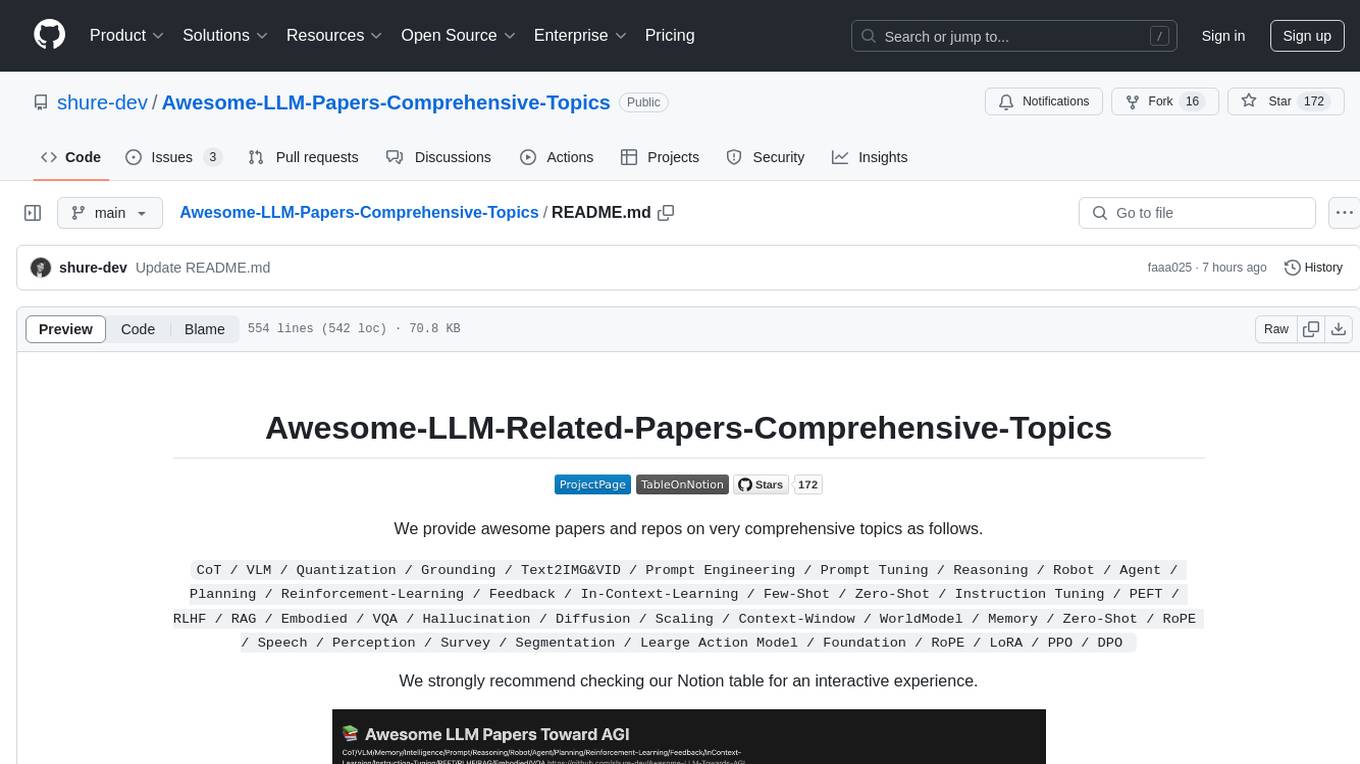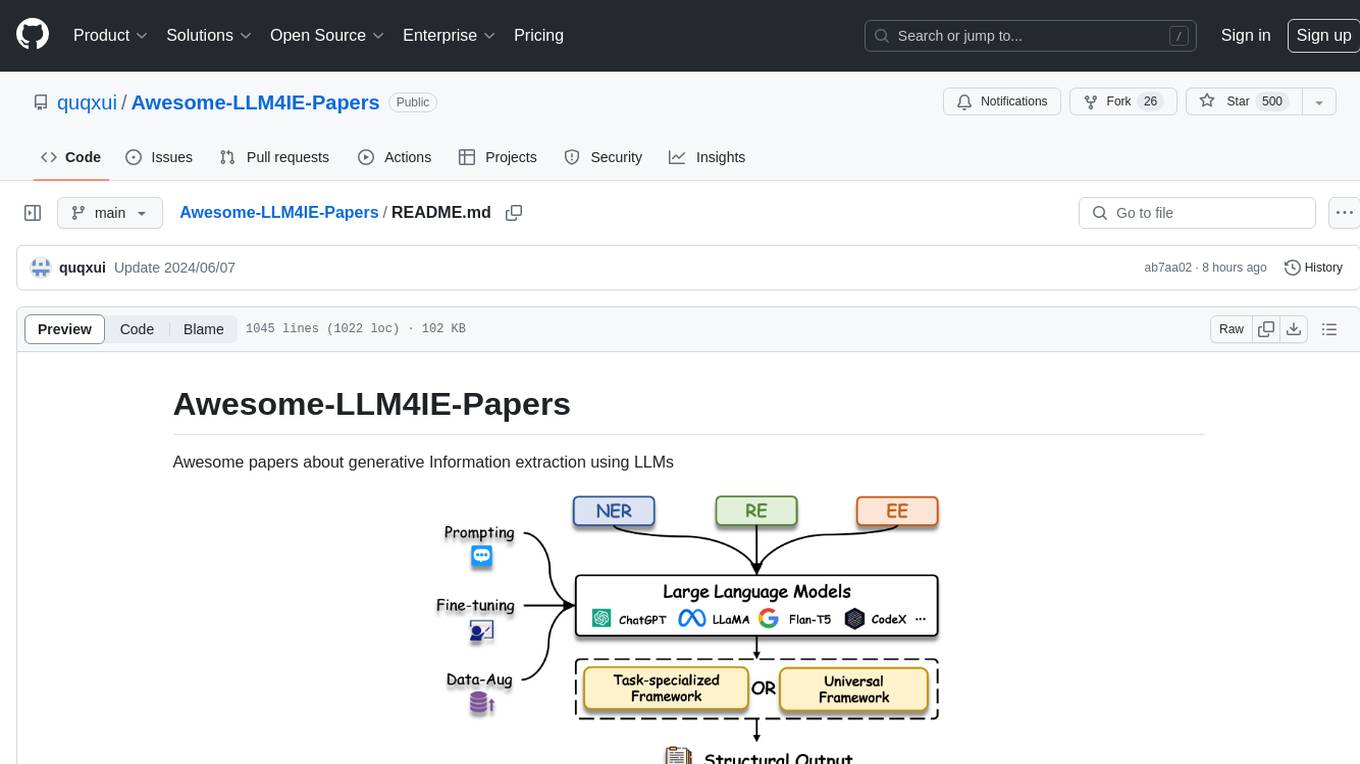
LLM4Opt
A Collection on Large Language Models for Optimization
Stars: 125
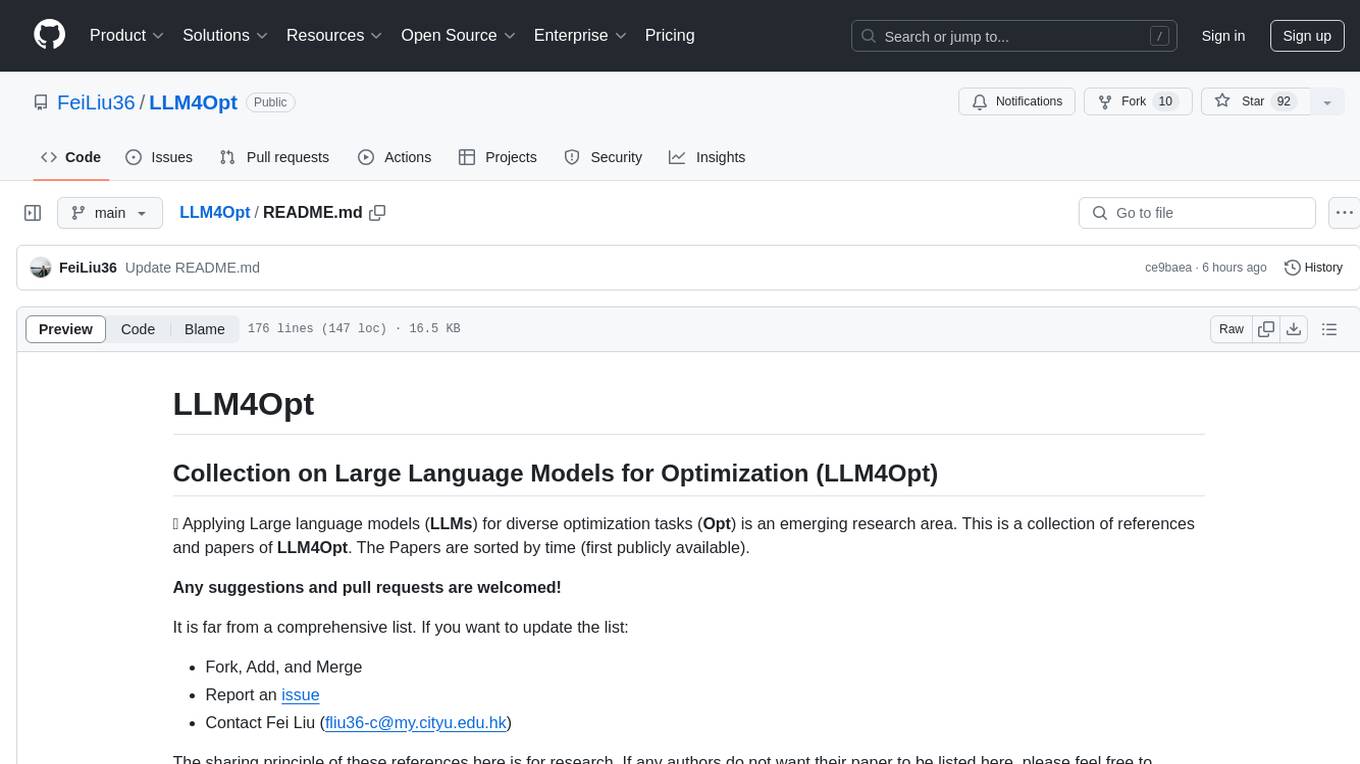
LLM4Opt is a collection of references and papers focusing on applying Large Language Models (LLMs) for diverse optimization tasks. The repository includes research papers, tutorials, workshops, competitions, and related collections related to LLMs in optimization. It covers a wide range of topics such as algorithm search, code generation, machine learning, science, industry, and more. The goal is to provide a comprehensive resource for researchers and practitioners interested in leveraging LLMs for optimization tasks.
README:
🔥 Applying Large language models (LLMs) for diverse optimization tasks (Opt) is an emerging research area. This is a collection of references and papers of LLM4Opt. The Papers are sorted by time (first publicly available).
Any suggestions and pull requests are welcomed!
It is far from a comprehensive list. If you want to update the list:
- Fork, Add, and Merge
- Report an issue
- Contact Fei Liu ([email protected])
The sharing principle of these references here is for research. If any authors do not want their paper to be listed here, please feel free to contact us.
| Project | Description |
|---|---|
| EoH (Evolution of Heuristics) | optimization, mathematics, machine learning, etc |
| OpenELM | robots, image, programming puzzles, etc |
| Course | Description |
|---|---|
| 2024 Fall, LLM Agents | LLM basics and LLM for agents |
| Event | Link |
|---|---|
| NeurIPS 2023 Workshop: Foundation Models for Decision Making | Link |
| AAAI 2024 Workshop: Public Sector LLMs: Algorithmic and Sociotechnical Design | Link |
| GECCO 2024 Workshop: Large Language Models for and with Evolutionary Computation (LLMfwEC) | Link |
| GECCO 2024 Workshop: EGML-EC — 3rd GECCO workshop on Enhancing Generative Machine Learning with Evolutionary Computation (EGML-EC) 2024 | Link |
| GECCO 2024 Tutorial: Using Large Language Models for Evolutionary Search | Tutorial Link, Tutorial Report Link |
| PPSN 2024 Tutorial: Large Language Models as Tools for Metaheuristic Design: Exploring Challenges and Opportunities | Link |
| KDD 2024 Tutorial: NL2Code-Reasoning and Planning with LLM for Code Development | Link, Link |
| ICML 2024 Workshop: AI for Math | Link |
| NeurIPS 2024 Workshop: Multimodal Algorithmic Reasoning (MAR) | Link |
| NeurIPS 2024 Workshop: The 4th Workshop on Mathematical Reasoning and AI | Link |
|
| Event | Link |
|---|---|
| AAAI 2024 Global Competition on Math Problem Solving and Reasoning | Link |
| ICML 2024 Challenges on Automated Math Reasoning | Link |
| Event | Link |
|---|---|
| IEEE TETCI, Special Issue on Neural Architecture Search and Large Machine Learning Models | Link |
| ACM TELO, Special Issue on Integrating Evolutionary Algorithms and Large Language Models | Link |
| IEEE TEVC, Special Issue on Evolutionary Computation Meets Large Language Models | link |
| Title | Publication with Date | Code | Paper |
|---|---|---|---|
| Evolutionary Computation in the Era of Large Language Model: Survey and Roadmap | Arxiv, Jan 2024 | [code] | paper |
| A Survey of Neural Code Intelligence: Paradigms, Advances and Beyond | Arxiv, Mar. 2024 | [code] | paper |
| When Large Language Model Meets Optimization | Arxiv, May 2024 | [code] | paper |
| Title | Publication with Date | Code | Paper |
|---|---|---|---|
| The Era OF Semantic Decoding | Arxiv, Mar. 2024 | [code] | paper |
| Leveraging Foundational Models for Black-Box Optimization: Benefits, Challenges, and Future Directions | ICML 2024, May 2024 | [code] | paper |
| Title | Publication with Date | Code | Paper |
|---|---|---|---|
| Hypothesis Search: Inductive Reasoning with Language Models | Arxiv Sep 2023, ICLR 2024 | [code] | paper |
| ToolChain*: Efficient Action Space Navigation in Large Language Models with A* Search | Arxiv Oct 2023, ICLR 2024 | [code] | paper |
| Algorithm Evolution using Large Language Model | Arxiv Nov 2023 | code | paper |
| Mathematical discoveries from program search with large language models | Nature | code | paper |
| Evolution of Heuristics: Towards Efficient Automatic Algorithm Design Using Large Language Model | ICML 2024 (Oral) | code | paper |
| ReEvo: Large Language Models as Hyper-Heuristics with Reflective Evolution | Arxiv Feb 2024, NeurIPS 2024 | code | paper |
| Discovering More Effective Tensor Network Structure Search Algorithms via Large Language Models (LLMs) | [code] | paper | |
| AutoSAT: Automatically Optimize SAT Solvers via Large Language Models | Arxiv Feb 2024 | [code] | paper |
| Large Language Models tO Enhance Bayesian Optimization | Arxiv Feb 2024, ICLR 2024 | [code] | paper |
| On the Self-Verification Limitations of Large Language Models on Reasoning and Planning Tasks | Arxiv Feb 2024 | [code] | paper |
| How Can LLM Guide RL? A Value-Based Approach | Arxiv Feb 2024 | code | paper |
| LLaMoCo: Instruction Tuning of Large Language Models for Optimization Code Generation | Arxiv Mar 2024 | code | paper |
| Evolve Cost-aware Acquisition Functions Using Large Language Models | PPSN 2024 | [code] | paper |
| Benchmarking ChatGPT on Algorithmic Reasoning | Arxiv April 2024 | [code] | paper |
| How Multimodal Integration Boost the Performance of LLM for Optimization: Case Study on Capacitated Vehicle Routing Problems | Arxiv March 2024 | [code] | paper |
| LLM-ABR: Designing Adaptive Bitrate Algorithms via Large Language Models | Arxiv April 2024 | [code] | paper |
| Constrained Neural Networks for Interpretable Heuristic Creation to Optimise Computer Algebra Systems | Arxiv April 2024 | [code] | paper |
| GLHF: General Learned Evolutionary Algorithm Via Hyper Functions | Arxiv | [code] | paper |
| tnGPS: Discovering Unknown Tensor Network Structure Search Algorithms via Large Language Models (LLMs) | ICML 2024 | [code] | paper |
| LLaMEA: A Large Language Model Evolutionary Algorithm for Automatically Generating Metaheuristics | Arxiv May 2024 | code | paper |
| Understanding the Importance of Evolutionary Search in Automated Heuristic Design with Large Language Models | PPSN 2024 | code | paper |
| Discovering Preference Optimization Algorithms with and for Large Language Models | Arxiv June 2024 | code | paper |
| OMNI-EPIC: Open-endedness via Models of human Notions of Interestingness with Environments Programmed in Code | Arxiv May 2024 | code | paper |
| Title | Publication with Date | Code | Paper |
|---|---|---|---|
| Large Language Models as Optimizers | Arxiv, Sep 2023 | code | paper |
| Large language model for multi-objective evolutionary optimization | Arxiv, Oct. 2023 | code | paper |
| Large Language Models as Evolutionary Optimizers | Arxiv, Oct. 2023 | [code] | paper |
| Using Large Language Models for Hyperparameter Optimization | NeurIPS 2023 | [code] | paper |
| Large Language Models As Evolution Strategies | Arxiv, Feb. 2024 | [code] | paper |
| Large Language Model-based Evolutionary Optimizer: Reasoning with Elitism | Arxiv, Mar. 2024 | [code] | paper |
| Large Language Model-Aided Evolutionary Search for Constrained Multiobjective Optimization | Arxiv, May 9, 2024 | [code] | paper |
| Towards Optimizing with Large Language Model | KDD 2024 | [code] | paper |
| Title | Publication with Date | Code | Paper |
|---|---|---|---|
| Large Language Models as Surrogate Models in Evolutionary Algorithms: A Preliminary Study | Arxiv, June 2024 | code | paper |
| Large Language Model-assisted Surrogate Modelling for Engineering Optimization | CAI, 2024 | [code] | paper |
| LLM Performance Predictors are good initializers for Architecture Search | Arxiv, Aug 2024 | [code] | paper |
| Title | Publication with Date | Code | Paper |
|---|---|---|---|
| L2MAC: LARGE LANGUAGE MODEL AUTOMATIC COMPUTER FOR EXTENSIVE CODE GENERATION | Arxiv Oct 2023, ICLR 2024 | [code] | paper |
| Title | Publication with Date | Code | Paper |
|---|---|---|---|
| Connecting Large Language Models with Evolutionary Algorithms Yields Powerful Prompt Optimizers | Arxiv Sep 2023, ICLR 2024 | [code] | paper |
| PromptAgent: Strategic Planning with Language Models Enables Expert-level Prompt Optimization | Arxiv Oct 2023, ICLR 2024 | [code] | paper |
| Title | Publication with Date | Code | Paper |
|---|---|---|---|
| Evolution through Large Models | Arxiv, June 2022 | code | paper |
| Think-on-Graph: Deep and Responsible Reasoning of Large Language Model on Knowledge Graph | Arxiv, July 2023, ICLR 2024 | [code] | paper |
| Evoprompting: Language models for code-level neural architecture search | NeuIPS 2023 | [code] | paper |
| Eureka: Human-Level Reward Design via Coding Large Language Models | ICLR 2024 | code | paper |
| Language Model Decoding as Direct Metrics Optimization | Arxiv, Oct 2023, ICLR 2024 | [code] | paper |
| Label-free Node Classification on Graphs with Large Language Models (LLMS) | Arxiv, Oct 2023, ICLR 2024 | [code] | paper |
| L-AutoDA: Leveraging Large Language Models for Automated Decision-based Adversarial Attacks | GECCO 2024, Jan 2024 | [code] | paper |
| Data-driven Discovery with Large Generative Models | Arxiv, Feb. 2024 | [code] | paper |
| Large Language Model-driven Meta-structure Discovery in Heterogeneous Information Network | Arxiv, Feb. 2024 | [code] | paper |
| LLM Guided Evolution-The Automation of Models Advancing Models | Arxiv, Mar. 2024 | [code] | paper |
| Identify Critical Nodes in Complex Network with Large Language Models | Arxiv, Mar. 2024 | [code] | paper |
| Evolving Interpretable Visual Classifiers with Large Language Models | Arxiv, April 2024 | [code] | paper |
| Title | Publication with Date | Code | Paper |
|---|---|---|---|
| Exploring evolution-aware & -free protein language models as protein function predictors | NeurIPS 2022 | [code] | paper |
| A Prompt-Engineered Large Language Model | Arxiv, Jan 2024 | [code] | paper |
| LLM-SR: Scientific Equation Discovery via Programming with Large Language Models | Arxiv, April 2024 | [code] | paper |
| Large Language Model Agent as a Mechanical Designer | Arxiv, April 2024 | [code] | paper |
| LLM and Simulation as Bilevel Optimizers: A New Paradigm to Advance Physical Scientific Discovery | Arxiv, May 2024 | code | paper |
| Taming Large Language Model For Conversational Protein Design | Openreview, 2024 | [code] | paper |
| Title | Publication with Date | Code | Paper |
|---|---|---|---|
| Large Language Models for Supply Chain Optimization | Arxiv, July 2023 | [code] | paper |
| How Can Large Language Models Help Humans in Design and Manufacturing | Arxiv, July 2023 | [code] | paper |
| LLM4EDA: Emerging Progress in Large Language Models for Electronic Design Automation | Arxiv, Dec. 2023 | [code] | paper |
| Collection | Link |
|---|---|
| Awesome LLM | Link |
| Foundation Models for Combinatorial Optimization | Link |
| LLM for Planning | Link |
| MOO-ML-Papers | Link |
For Tasks:
Click tags to check more tools for each tasksFor Jobs:
Alternative AI tools for LLM4Opt
Similar Open Source Tools

LLM4Opt
LLM4Opt is a collection of references and papers focusing on applying Large Language Models (LLMs) for diverse optimization tasks. The repository includes research papers, tutorials, workshops, competitions, and related collections related to LLMs in optimization. It covers a wide range of topics such as algorithm search, code generation, machine learning, science, industry, and more. The goal is to provide a comprehensive resource for researchers and practitioners interested in leveraging LLMs for optimization tasks.
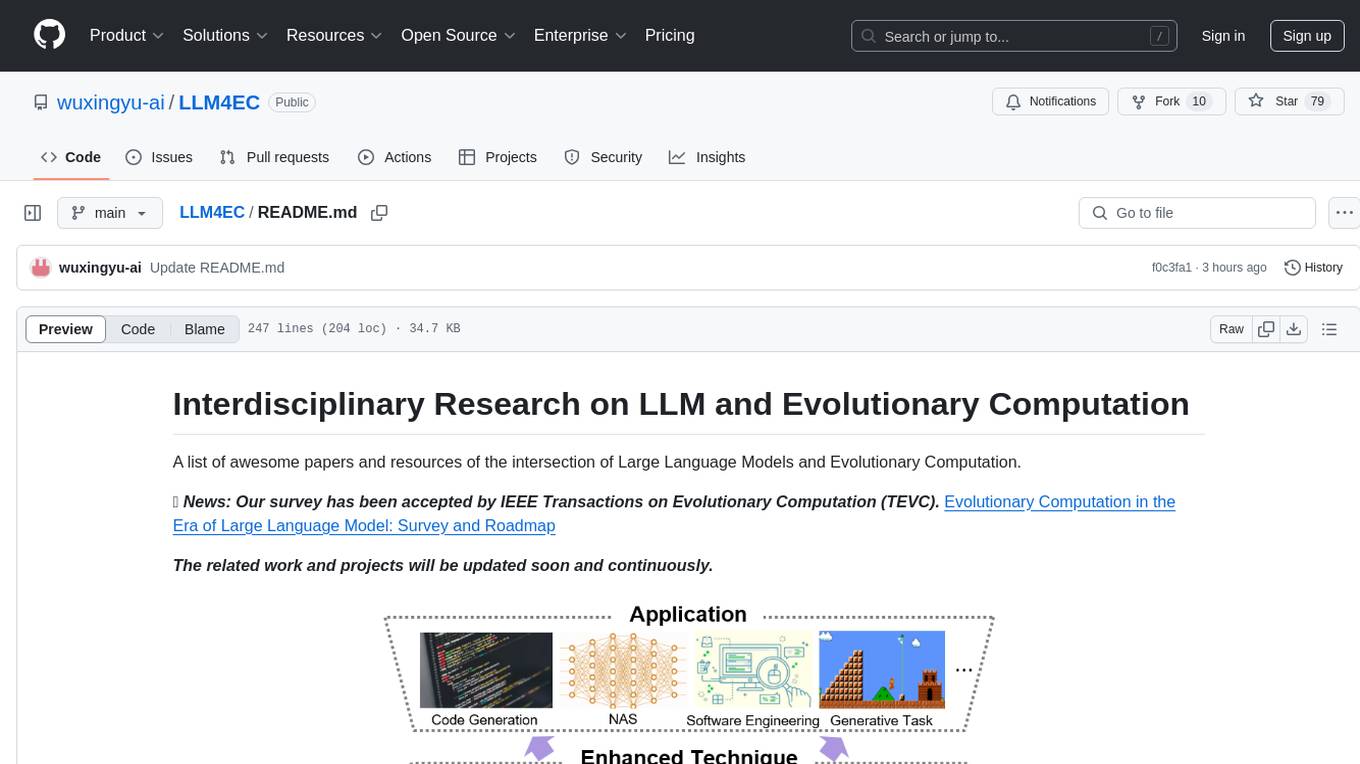
LLM4EC
LLM4EC is an interdisciplinary research repository focusing on the intersection of Large Language Models (LLM) and Evolutionary Computation (EC). It provides a comprehensive collection of papers and resources exploring various applications, enhancements, and synergies between LLM and EC. The repository covers topics such as LLM-assisted optimization, EA-based LLM architecture search, and applications in code generation, software engineering, neural architecture search, and other generative tasks. The goal is to facilitate research and development in leveraging LLM and EC for innovative solutions in diverse domains.
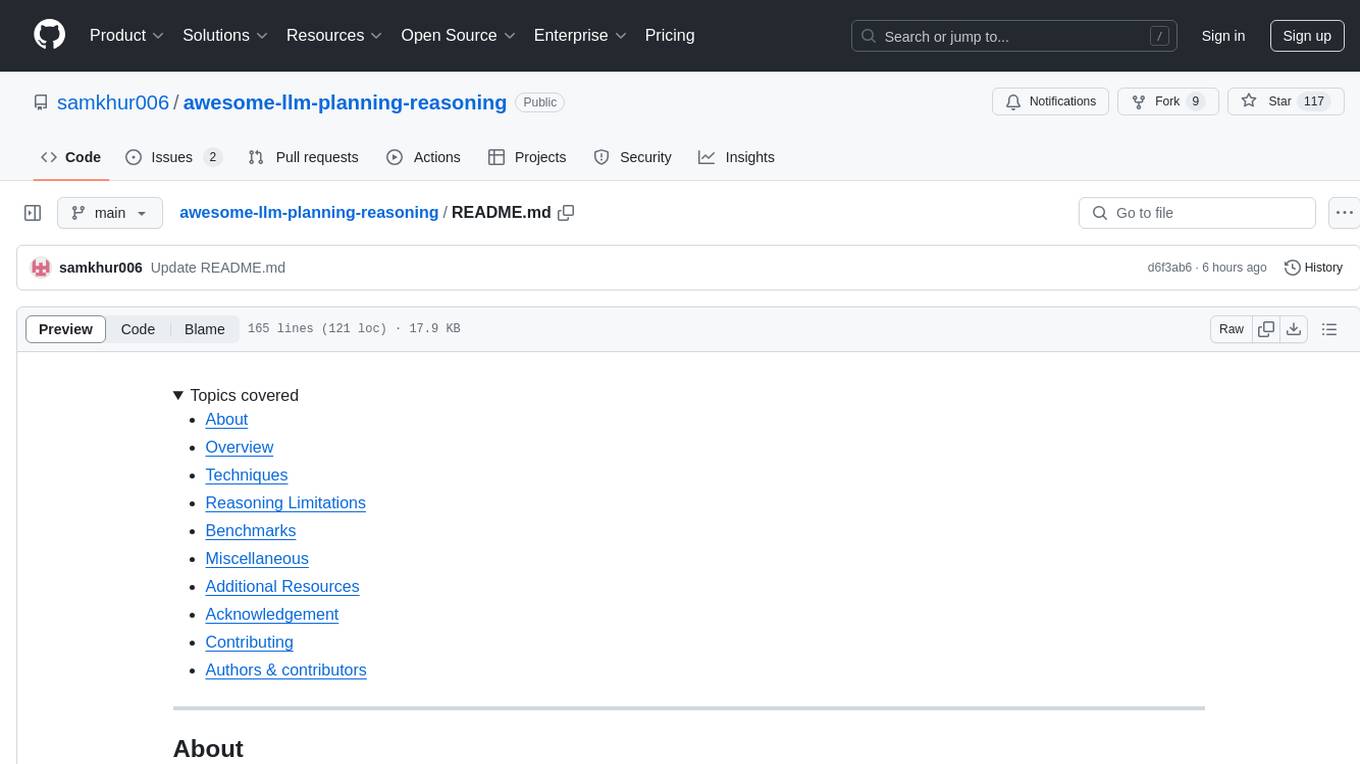
awesome-llm-planning-reasoning
The 'Awesome LLMs Planning Reasoning' repository is a curated collection focusing on exploring the capabilities of Large Language Models (LLMs) in planning and reasoning tasks. It includes research papers, code repositories, and benchmarks that delve into innovative techniques, reasoning limitations, and standardized evaluations related to LLMs' performance in complex cognitive tasks. The repository serves as a comprehensive resource for researchers, developers, and enthusiasts interested in understanding the advancements and challenges in leveraging LLMs for planning and reasoning in real-world scenarios.
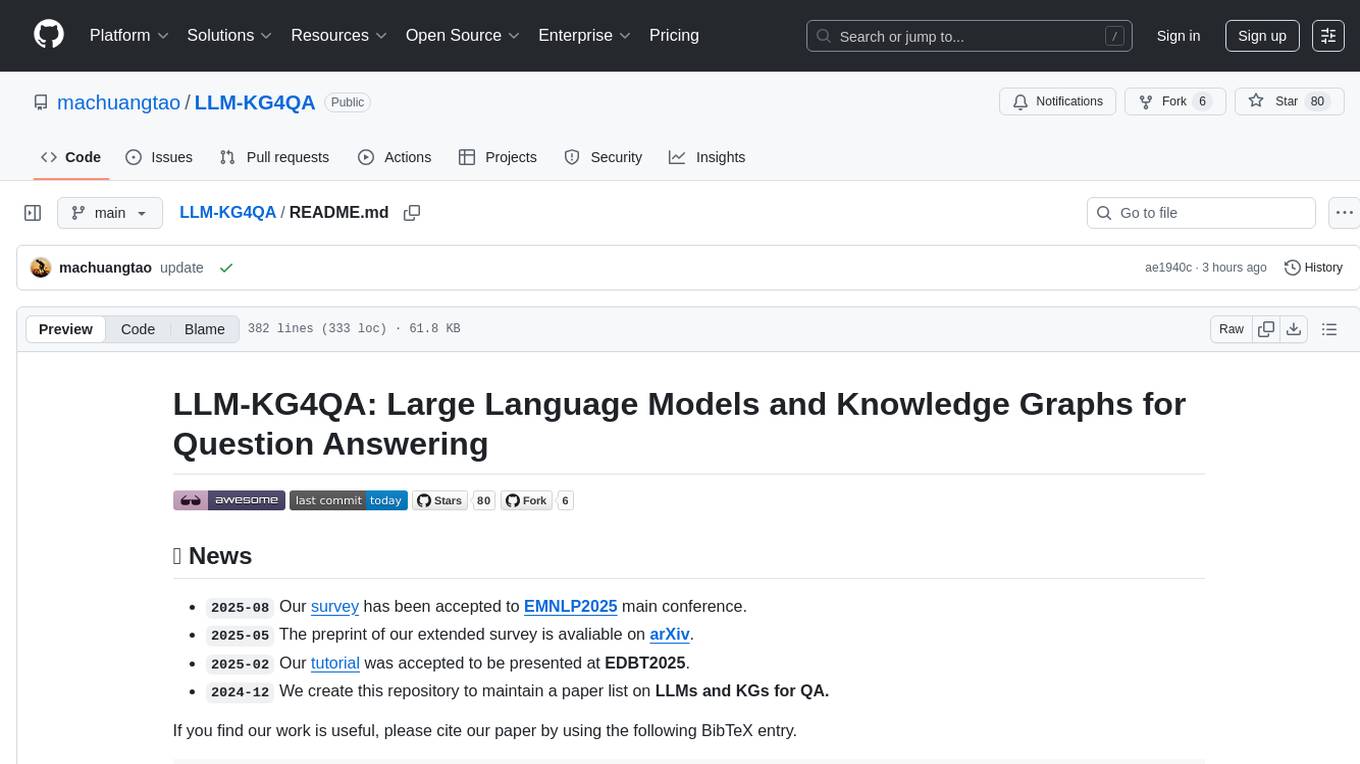
LLM-KG4QA
LLM-KG4QA is a repository focused on the integration of Large Language Models (LLMs) and Knowledge Graphs (KGs) for Question Answering (QA). It covers various aspects such as using KGs as background knowledge, reasoning guideline, and refiner/filter. The repository provides detailed information on pre-training, fine-tuning, and Retrieval Augmented Generation (RAG) techniques for enhancing QA performance. It also explores complex QA tasks like Explainable QA, Multi-Modal QA, Multi-Document QA, Multi-Hop QA, Multi-run and Conversational QA, Temporal QA, Multi-domain and Multilingual QA, along with advanced topics like Optimization and Data Management. Additionally, it includes benchmark datasets, industrial and scientific applications, demos, and related surveys in the field.
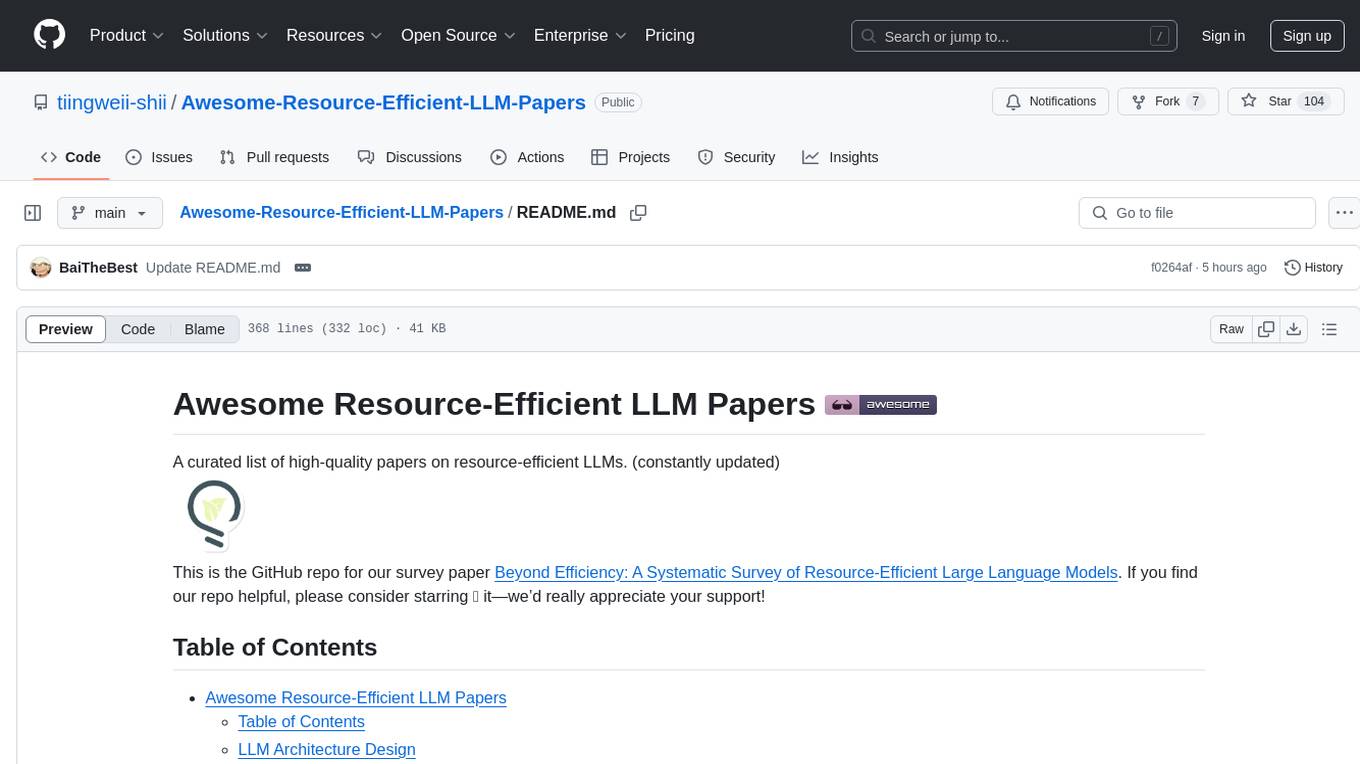
Awesome-Resource-Efficient-LLM-Papers
A curated list of high-quality papers on resource-efficient Large Language Models (LLMs) with a focus on various aspects such as architecture design, pre-training, fine-tuning, inference, system design, and evaluation metrics. The repository covers topics like efficient transformer architectures, non-transformer architectures, memory efficiency, data efficiency, model compression, dynamic acceleration, deployment optimization, support infrastructure, and other related systems. It also provides detailed information on computation metrics, memory metrics, energy metrics, financial cost metrics, network communication metrics, and other metrics relevant to resource-efficient LLMs. The repository includes benchmarks for evaluating the efficiency of NLP models and references for further reading.
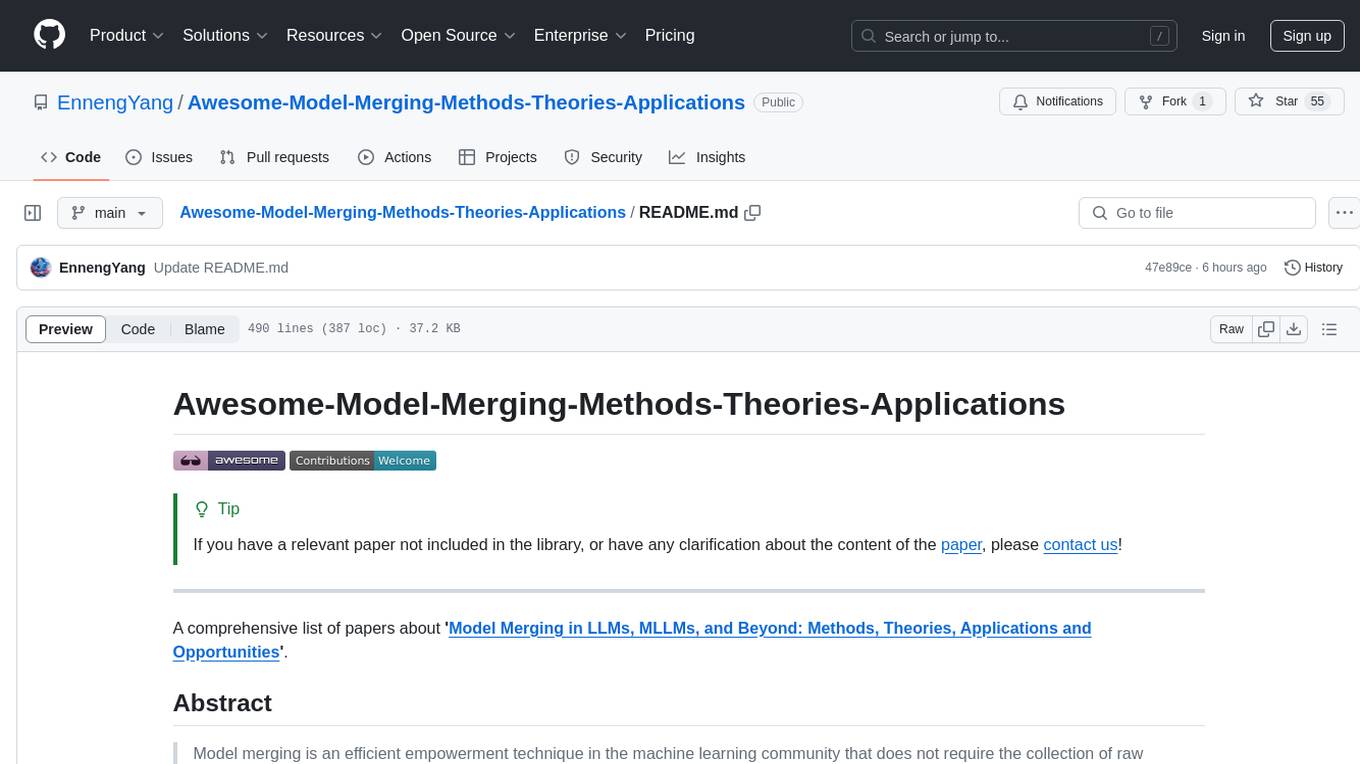
Awesome-Model-Merging-Methods-Theories-Applications
A comprehensive repository focusing on 'Model Merging in LLMs, MLLMs, and Beyond', providing an exhaustive overview of model merging methods, theories, applications, and future research directions. The repository covers various advanced methods, applications in foundation models, different machine learning subfields, and tasks like pre-merging methods, architecture transformation, weight alignment, basic merging methods, and more.
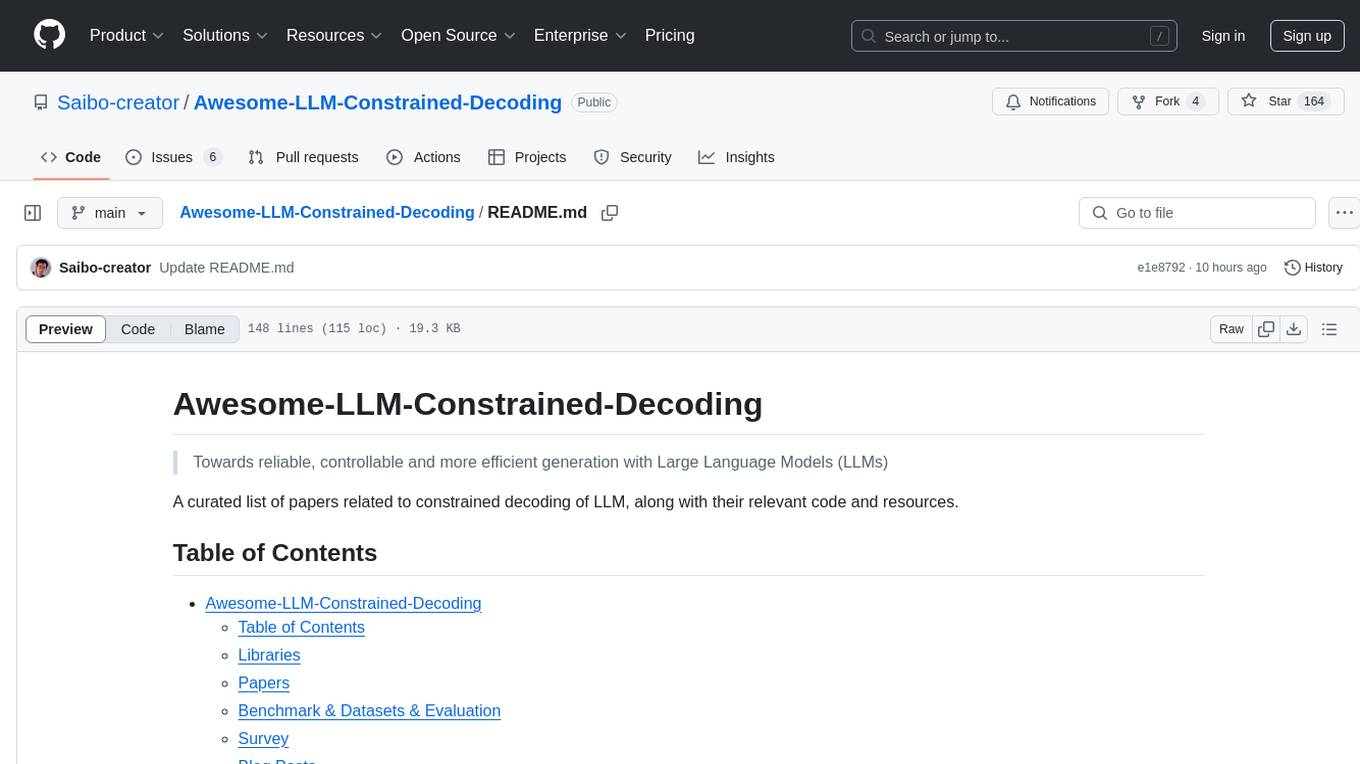
Awesome-LLM-Constrained-Decoding
Awesome-LLM-Constrained-Decoding is a curated list of papers, code, and resources related to constrained decoding of Large Language Models (LLMs). The repository aims to facilitate reliable, controllable, and efficient generation with LLMs by providing a comprehensive collection of materials in this domain.
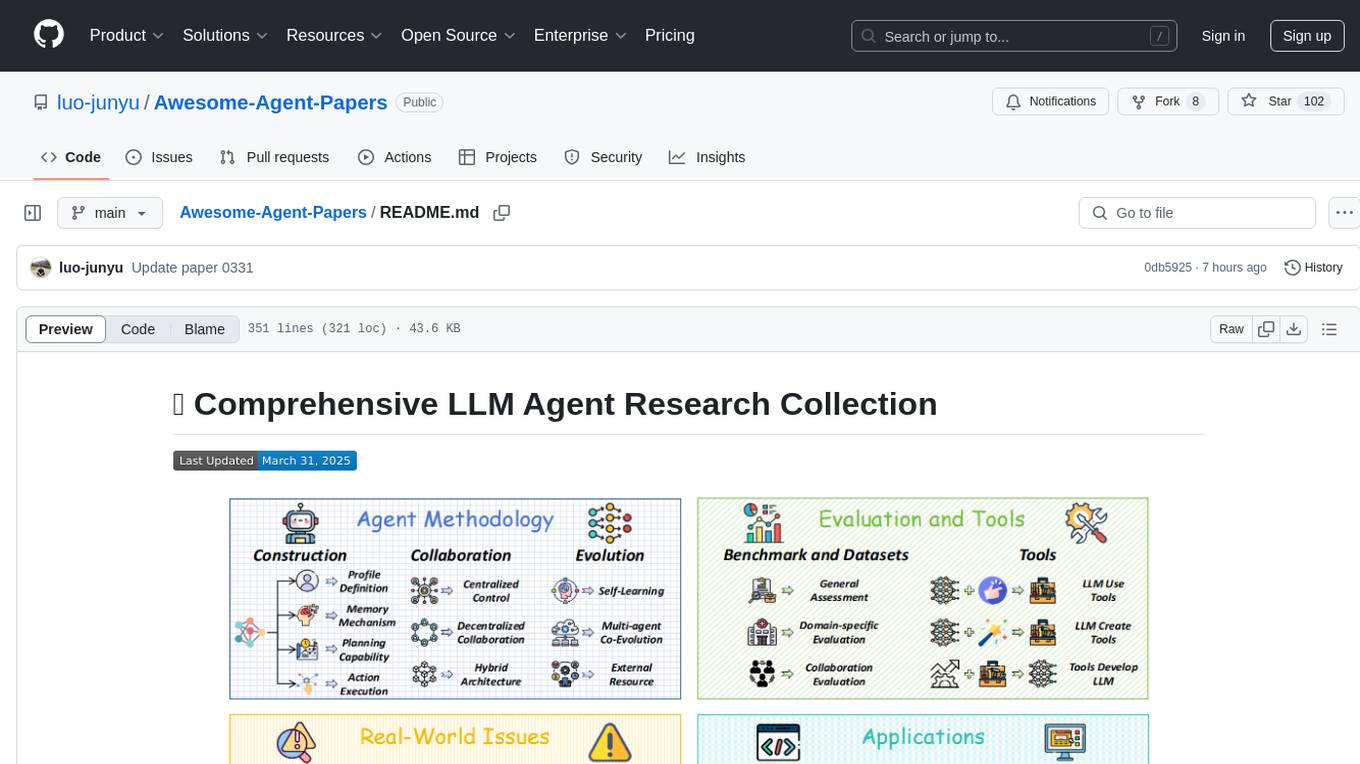
Awesome-Agent-Papers
This repository is a comprehensive collection of research papers on Large Language Model (LLM) agents, organized across key categories including agent construction, collaboration mechanisms, evolution, tools, security, benchmarks, and applications. The taxonomy provides a structured framework for understanding the field of LLM agents, bridging fragmented research threads by highlighting connections between agent design principles and emergent behaviors.
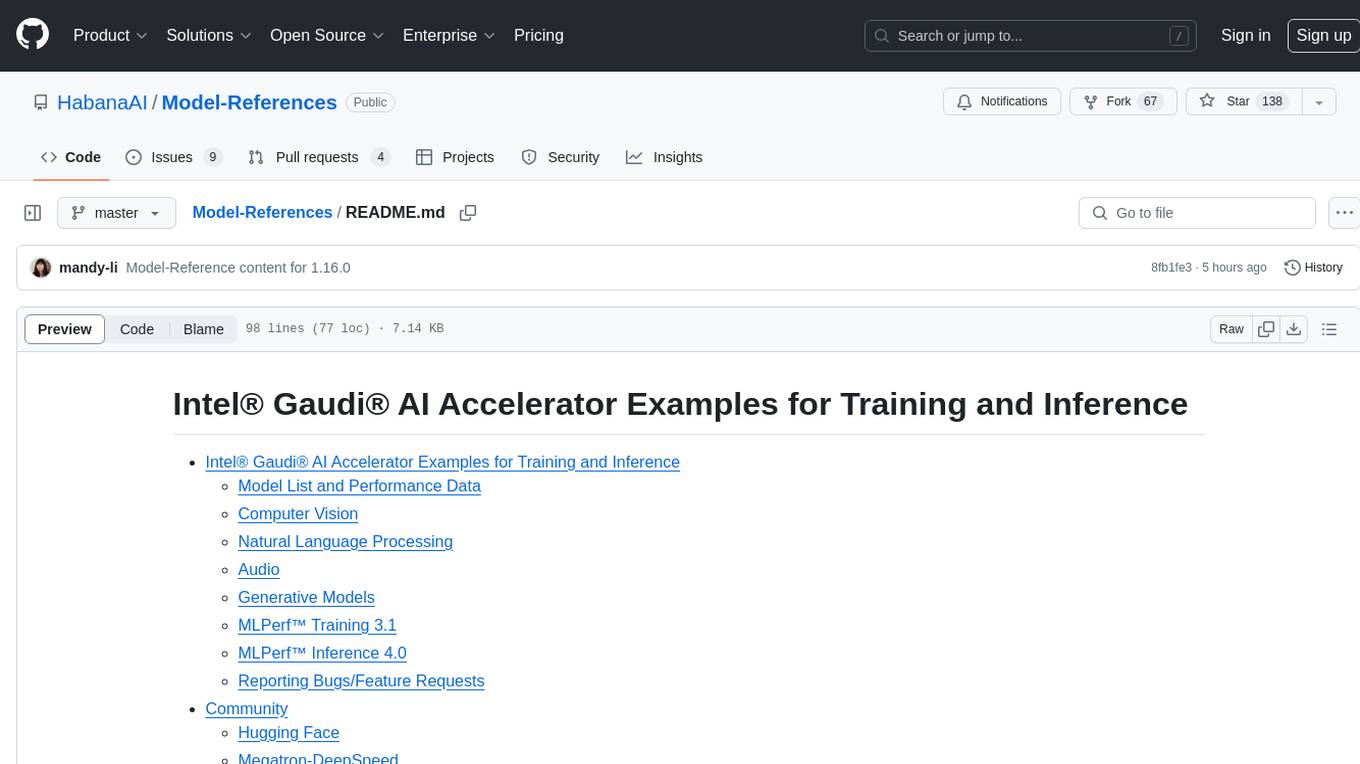
Model-References
The 'Model-References' repository contains examples for training and inference using Intel Gaudi AI Accelerator. It includes models for computer vision, natural language processing, audio, generative models, MLPerf™ training, and MLPerf™ inference. The repository provides performance data and model validation information for various frameworks like PyTorch. Users can find examples of popular models like ResNet, BERT, and Stable Diffusion optimized for Intel Gaudi AI accelerator.
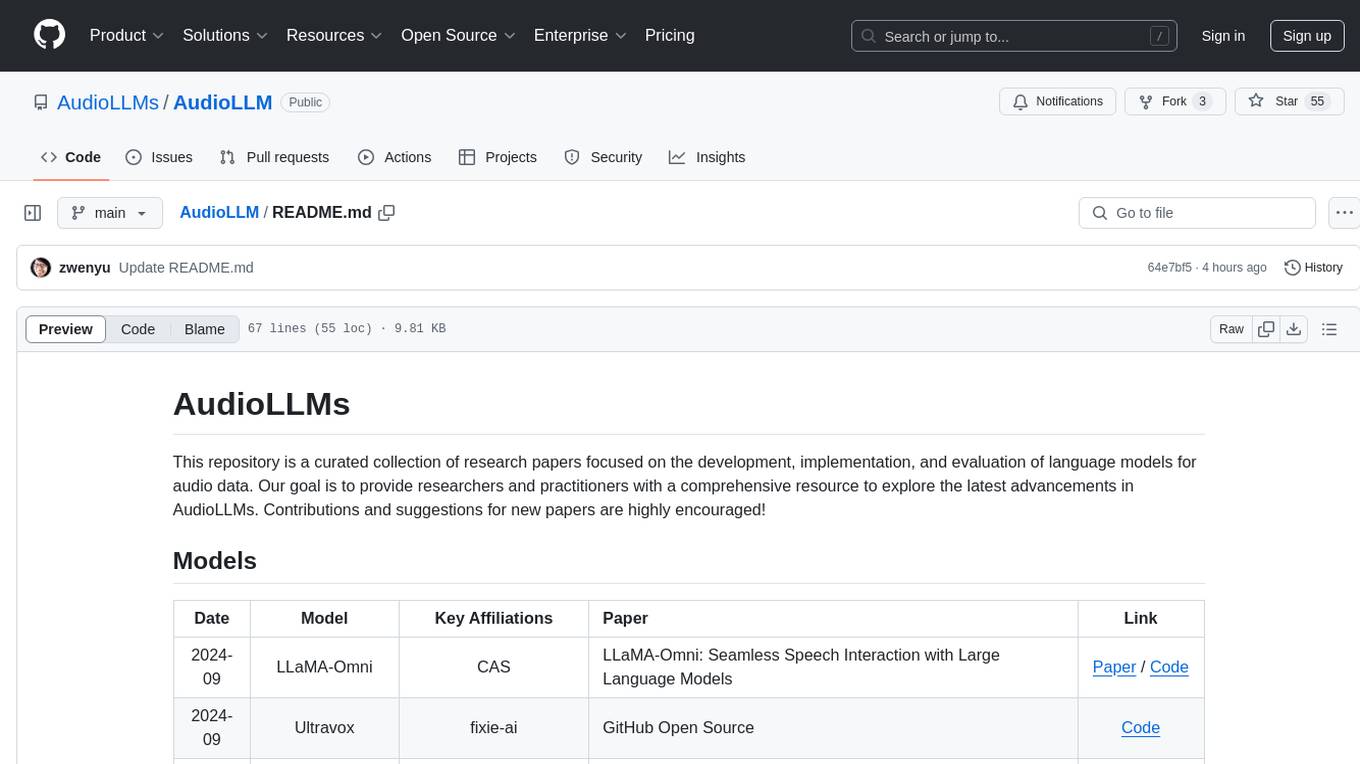
AudioLLM
AudioLLMs is a curated collection of research papers focusing on developing, implementing, and evaluating language models for audio data. The repository aims to provide researchers and practitioners with a comprehensive resource to explore the latest advancements in AudioLLMs. It includes models for speech interaction, speech recognition, speech translation, audio generation, and more. Additionally, it covers methodologies like multitask audioLLMs and segment-level Q-Former, as well as evaluation benchmarks like AudioBench and AIR-Bench. Adversarial attacks such as VoiceJailbreak are also discussed.
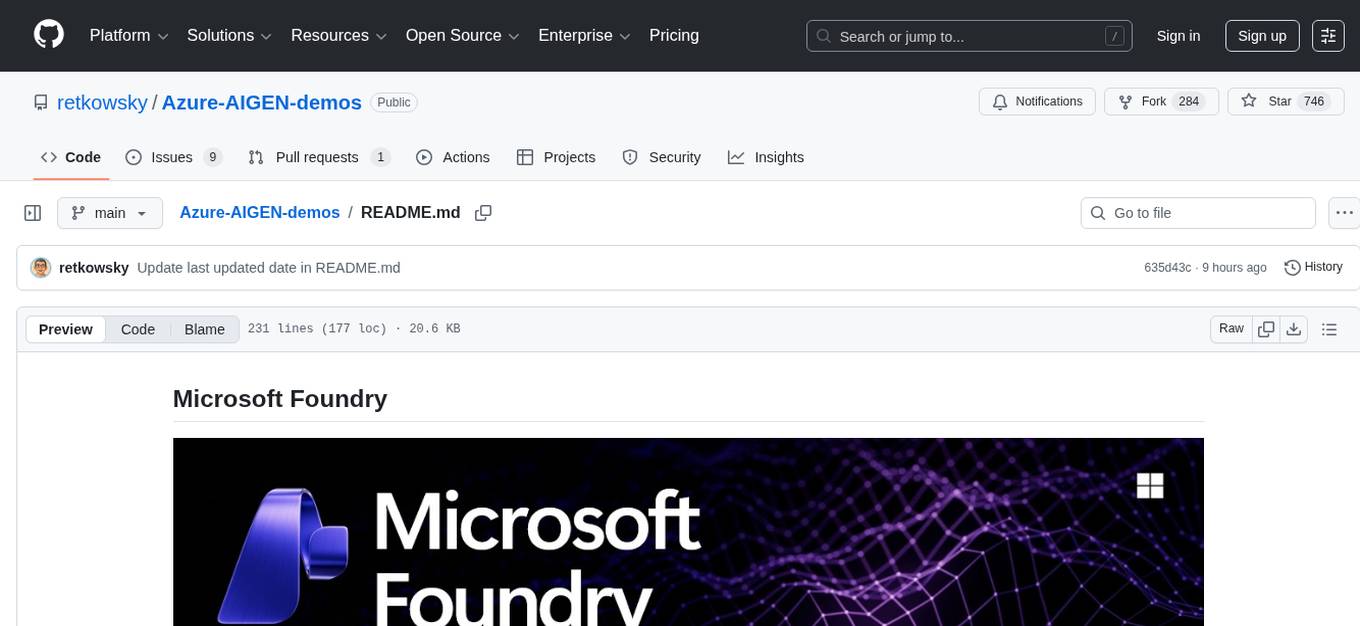
Azure-AIGEN-demos
Microsoft Foundry is a unified Azure platform-as-a-service offering for enterprise AI operations, model builders, and application development. This foundation combines production-grade infrastructure with friendly interfaces, enabling developers to focus on building applications rather than managing infrastructure. Microsoft Foundry unifies agents, models, and tools under a single management grouping with built-in enterprise-readiness capabilities including tracing, monitoring, evaluations, and customizable enterprise setup configurations. The platform provides streamlined management through unified Role-based access control (RBAC), networking, and policies under one Azure resource provider namespace.
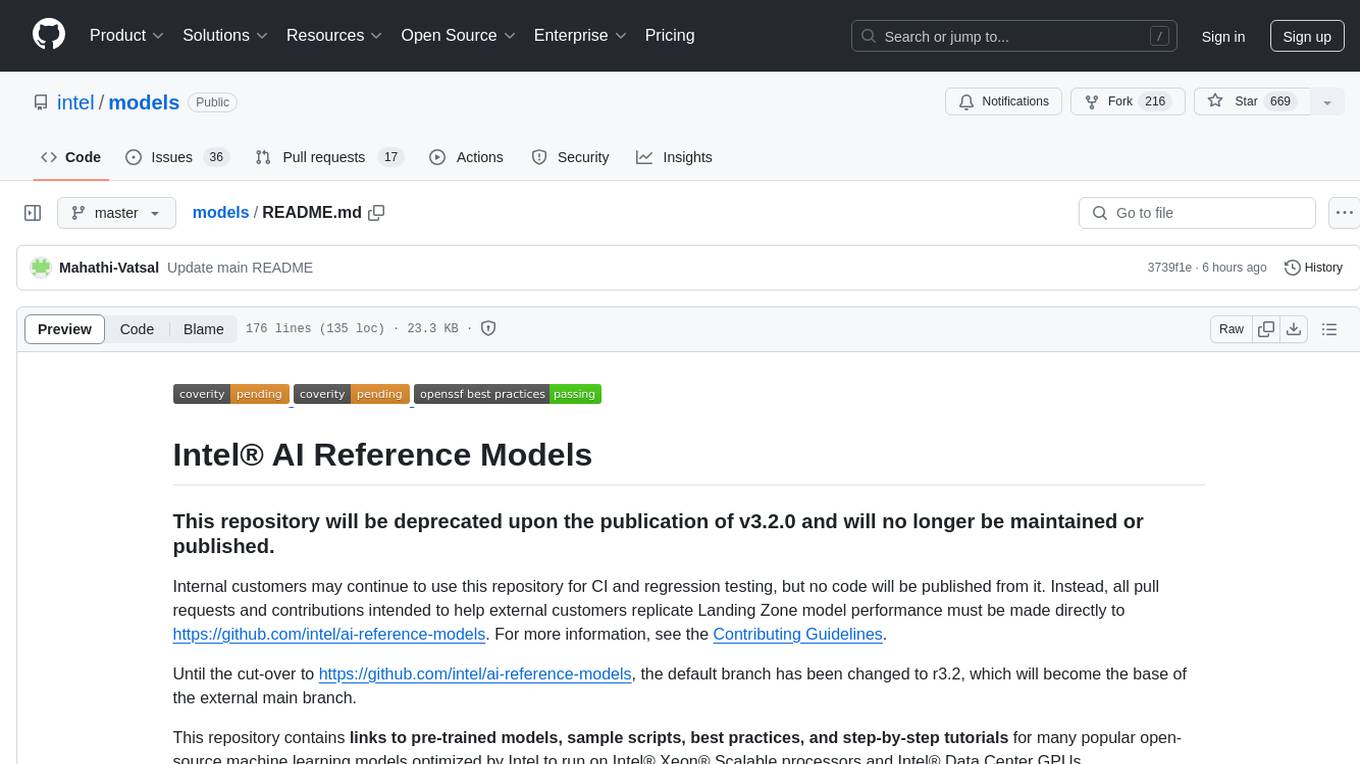
models
The Intel® AI Reference Models repository contains links to pre-trained models, sample scripts, best practices, and tutorials for popular open-source machine learning models optimized by Intel to run on Intel® Xeon® Scalable processors and Intel® Data Center GPUs. It aims to replicate the best-known performance of target model/dataset combinations in optimally-configured hardware environments. The repository will be deprecated upon the publication of v3.2.0 and will no longer be maintained or published.
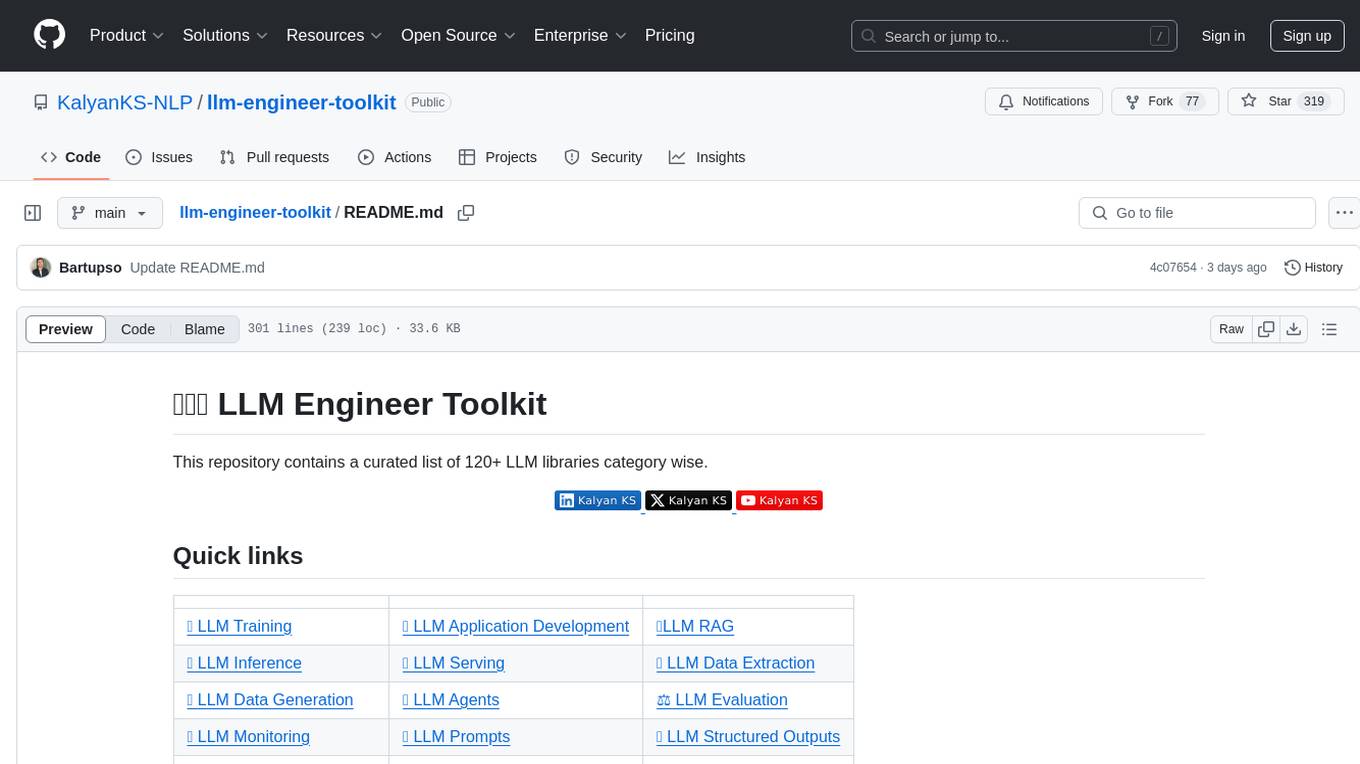
llm-engineer-toolkit
The LLM Engineer Toolkit is a curated repository containing over 120 LLM libraries categorized for various tasks such as training, application development, inference, serving, data extraction, data generation, agents, evaluation, monitoring, prompts, structured outputs, safety, security, embedding models, and other miscellaneous tools. It includes libraries for fine-tuning LLMs, building applications powered by LLMs, serving LLM models, extracting data, generating synthetic data, creating AI agents, evaluating LLM applications, monitoring LLM performance, optimizing prompts, handling structured outputs, ensuring safety and security, embedding models, and more. The toolkit covers a wide range of tools and frameworks to streamline the development, deployment, and optimization of large language models.
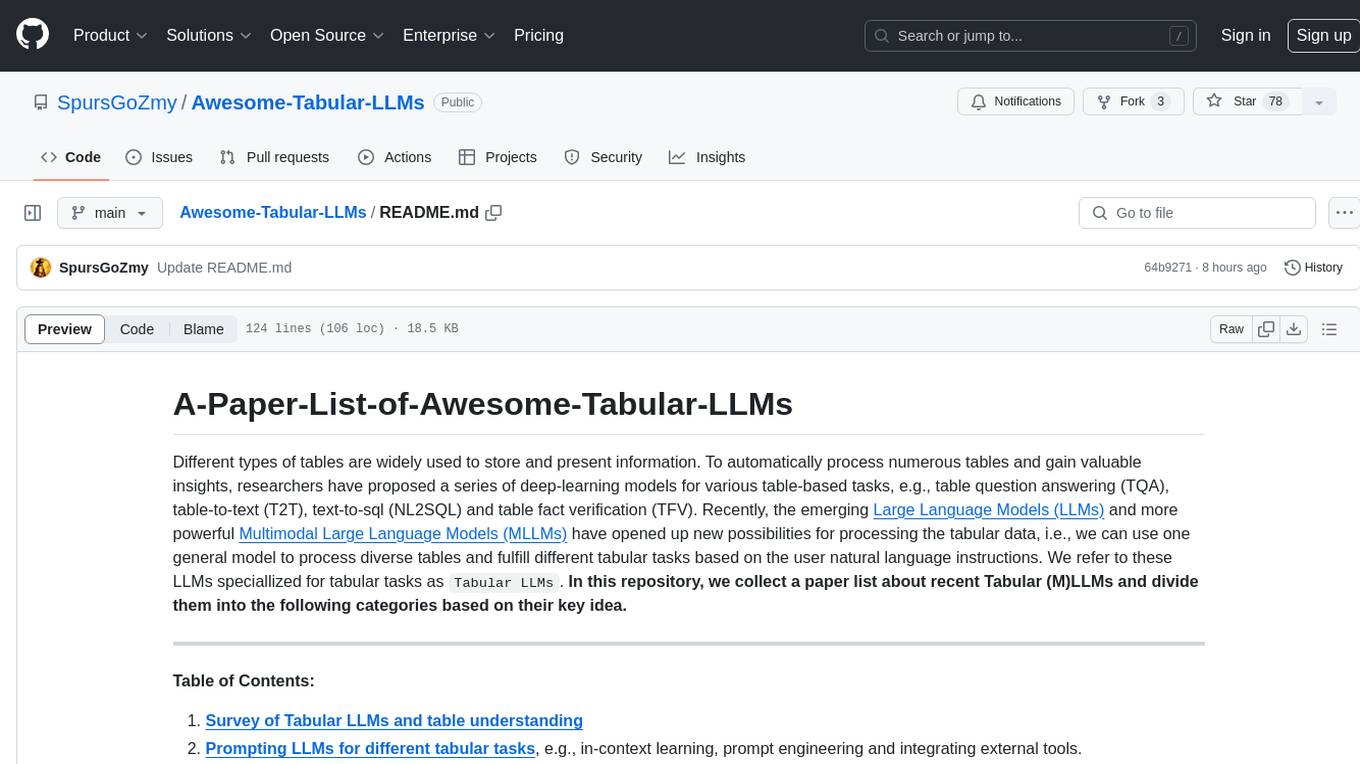
Awesome-Tabular-LLMs
This repository is a collection of papers on Tabular Large Language Models (LLMs) specialized for processing tabular data. It includes surveys, models, and applications related to table understanding tasks such as Table Question Answering, Table-to-Text, Text-to-SQL, and more. The repository categorizes the papers based on key ideas and provides insights into the advancements in using LLMs for processing diverse tables and fulfilling various tabular tasks based on natural language instructions.
For similar tasks

LLM4Opt
LLM4Opt is a collection of references and papers focusing on applying Large Language Models (LLMs) for diverse optimization tasks. The repository includes research papers, tutorials, workshops, competitions, and related collections related to LLMs in optimization. It covers a wide range of topics such as algorithm search, code generation, machine learning, science, industry, and more. The goal is to provide a comprehensive resource for researchers and practitioners interested in leveraging LLMs for optimization tasks.

ai-guide
This guide is dedicated to Large Language Models (LLMs) that you can run on your home computer. It assumes your PC is a lower-end, non-gaming setup.

onnxruntime-genai
ONNX Runtime Generative AI is a library that provides the generative AI loop for ONNX models, including inference with ONNX Runtime, logits processing, search and sampling, and KV cache management. Users can call a high level `generate()` method, or run each iteration of the model in a loop. It supports greedy/beam search and TopP, TopK sampling to generate token sequences, has built in logits processing like repetition penalties, and allows for easy custom scoring.

mistral.rs
Mistral.rs is a fast LLM inference platform written in Rust. We support inference on a variety of devices, quantization, and easy-to-use application with an Open-AI API compatible HTTP server and Python bindings.
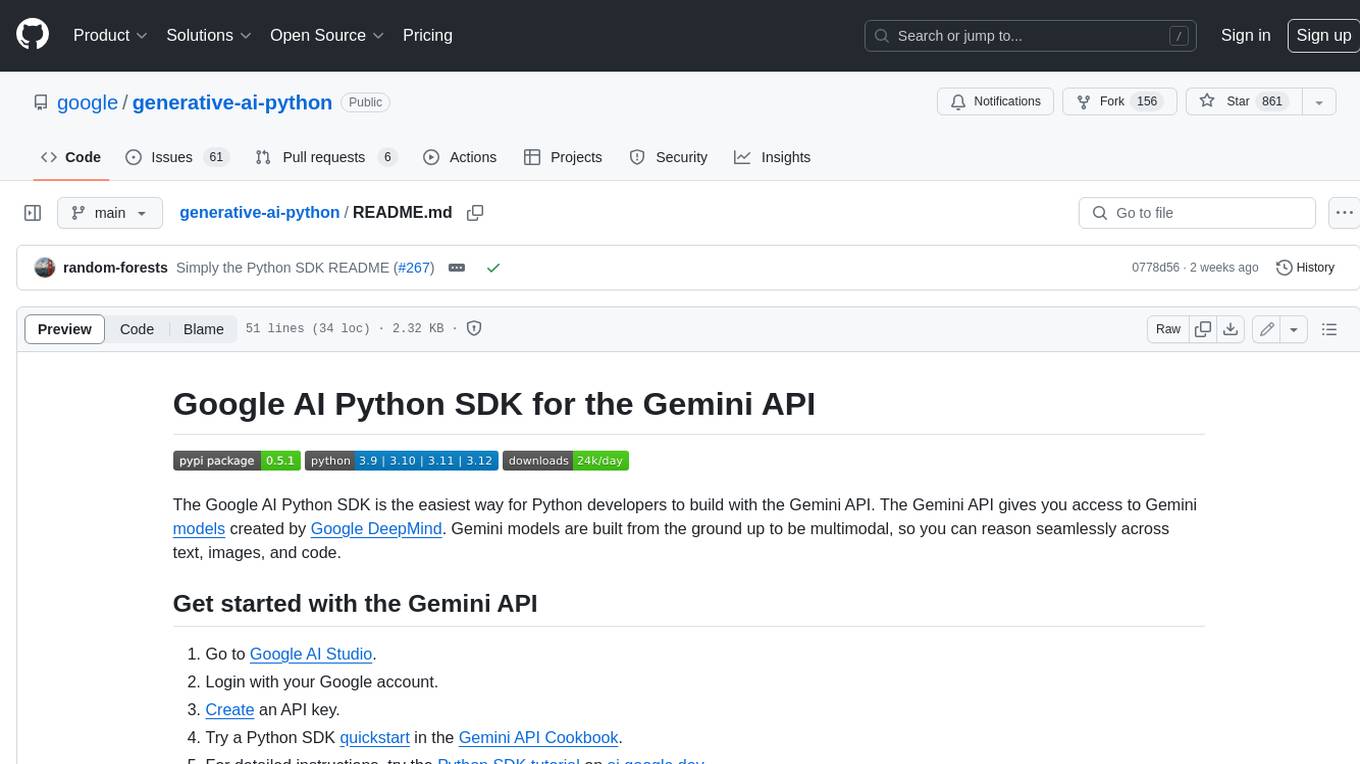
generative-ai-python
The Google AI Python SDK is the easiest way for Python developers to build with the Gemini API. The Gemini API gives you access to Gemini models created by Google DeepMind. Gemini models are built from the ground up to be multimodal, so you can reason seamlessly across text, images, and code.
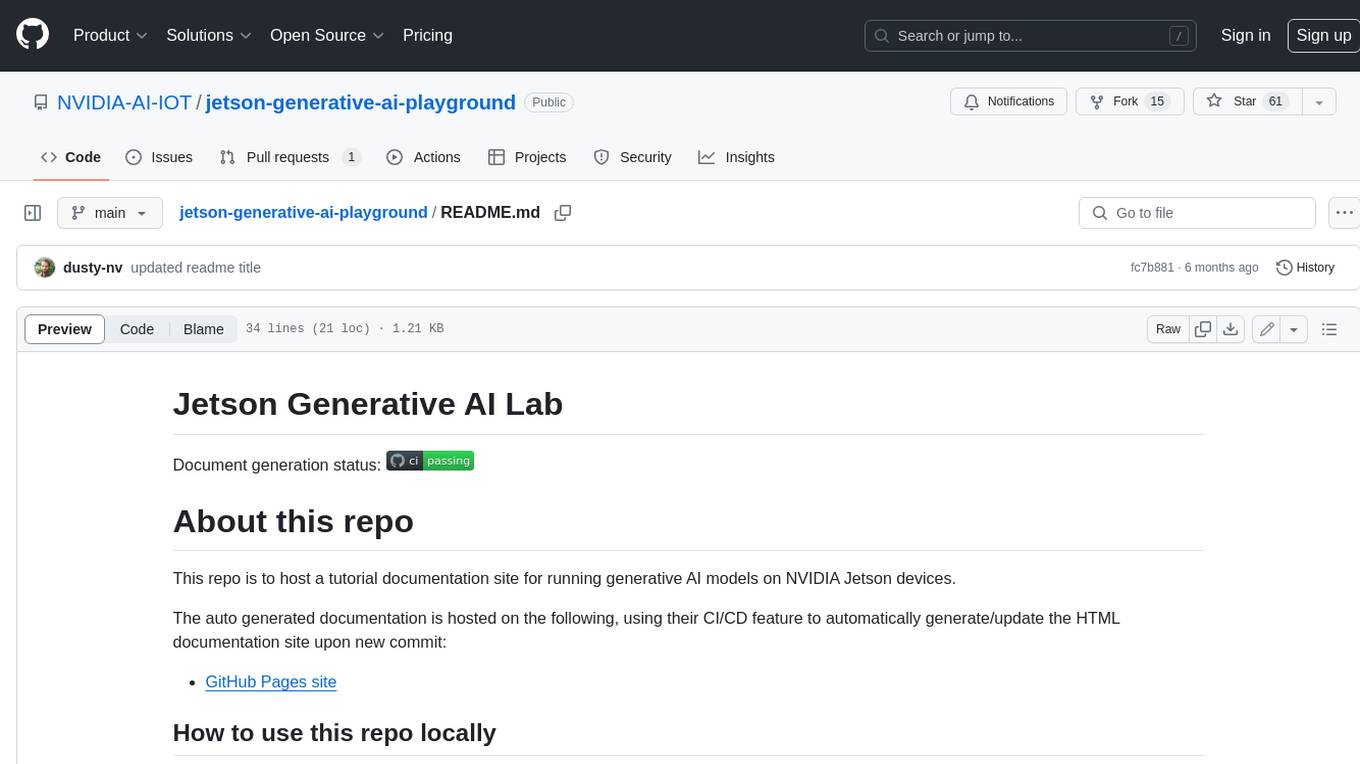
jetson-generative-ai-playground
This repo hosts tutorial documentation for running generative AI models on NVIDIA Jetson devices. The documentation is auto-generated and hosted on GitHub Pages using their CI/CD feature to automatically generate/update the HTML documentation site upon new commits.

chat-ui
A chat interface using open source models, eg OpenAssistant or Llama. It is a SvelteKit app and it powers the HuggingChat app on hf.co/chat.

MetaGPT
MetaGPT is a multi-agent framework that enables GPT to work in a software company, collaborating to tackle more complex tasks. It assigns different roles to GPTs to form a collaborative entity for complex tasks. MetaGPT takes a one-line requirement as input and outputs user stories, competitive analysis, requirements, data structures, APIs, documents, etc. Internally, MetaGPT includes product managers, architects, project managers, and engineers. It provides the entire process of a software company along with carefully orchestrated SOPs. MetaGPT's core philosophy is "Code = SOP(Team)", materializing SOP and applying it to teams composed of LLMs.
For similar jobs

weave
Weave is a toolkit for developing Generative AI applications, built by Weights & Biases. With Weave, you can log and debug language model inputs, outputs, and traces; build rigorous, apples-to-apples evaluations for language model use cases; and organize all the information generated across the LLM workflow, from experimentation to evaluations to production. Weave aims to bring rigor, best-practices, and composability to the inherently experimental process of developing Generative AI software, without introducing cognitive overhead.

LLMStack
LLMStack is a no-code platform for building generative AI agents, workflows, and chatbots. It allows users to connect their own data, internal tools, and GPT-powered models without any coding experience. LLMStack can be deployed to the cloud or on-premise and can be accessed via HTTP API or triggered from Slack or Discord.

VisionCraft
The VisionCraft API is a free API for using over 100 different AI models. From images to sound.

kaito
Kaito is an operator that automates the AI/ML inference model deployment in a Kubernetes cluster. It manages large model files using container images, avoids tuning deployment parameters to fit GPU hardware by providing preset configurations, auto-provisions GPU nodes based on model requirements, and hosts large model images in the public Microsoft Container Registry (MCR) if the license allows. Using Kaito, the workflow of onboarding large AI inference models in Kubernetes is largely simplified.

PyRIT
PyRIT is an open access automation framework designed to empower security professionals and ML engineers to red team foundation models and their applications. It automates AI Red Teaming tasks to allow operators to focus on more complicated and time-consuming tasks and can also identify security harms such as misuse (e.g., malware generation, jailbreaking), and privacy harms (e.g., identity theft). The goal is to allow researchers to have a baseline of how well their model and entire inference pipeline is doing against different harm categories and to be able to compare that baseline to future iterations of their model. This allows them to have empirical data on how well their model is doing today, and detect any degradation of performance based on future improvements.

tabby
Tabby is a self-hosted AI coding assistant, offering an open-source and on-premises alternative to GitHub Copilot. It boasts several key features: * Self-contained, with no need for a DBMS or cloud service. * OpenAPI interface, easy to integrate with existing infrastructure (e.g Cloud IDE). * Supports consumer-grade GPUs.

spear
SPEAR (Simulator for Photorealistic Embodied AI Research) is a powerful tool for training embodied agents. It features 300 unique virtual indoor environments with 2,566 unique rooms and 17,234 unique objects that can be manipulated individually. Each environment is designed by a professional artist and features detailed geometry, photorealistic materials, and a unique floor plan and object layout. SPEAR is implemented as Unreal Engine assets and provides an OpenAI Gym interface for interacting with the environments via Python.

Magick
Magick is a groundbreaking visual AIDE (Artificial Intelligence Development Environment) for no-code data pipelines and multimodal agents. Magick can connect to other services and comes with nodes and templates well-suited for intelligent agents, chatbots, complex reasoning systems and realistic characters.

